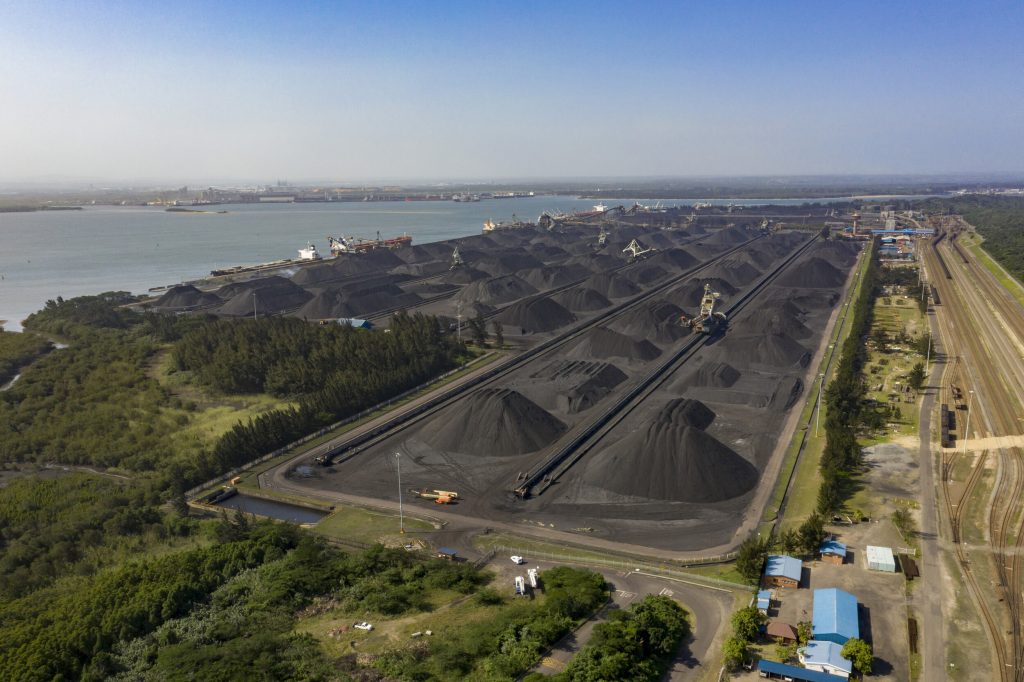- The Richard’s Bay Coal Terminal exported 47.21 million tonnes of coal in 2023, down from a record high of 76.47 million in 2017.
- Exports have been declining every year since and are lower than the 48.59 million tonnes exported in 1992.
- But the RBCT and Transnet say they hope their improved cooperation over the past four months will help increase volumes to 60 million tonnes in 2024.
Richards Bay Coal Terminal (RBCT) last year had its lowest exports in over three decades as Transnet’s railing troubles continue, falling another 5% from an also dismal 2022.
SA’s largest coal export terminal only passed through 47.21 million tonnes in 2023, about half its capacity and even lower than what was shipped in 1992.
The terminal, which is owned by SA’s largest coal producers, has been through a number of expansions in recent years, growing to 53 million tonnes in 1991, from 44 million. Currently, it’s capable of a theoretical 91 million tonnes, or 32 trains per day, and it’s now hoped that close cooperation with Transnet will ensure 60 million tonnes move in 2024.
This would still be a significant drop from the record high of 76.47 million tonnes exported in 2017, when an average of 27 trains a day offloaded their cargo.
“There has been a constant and drastic decline in volumes over the last four years,” RBCT chairperson, Nosipho Damasane, said during a briefing on Thursday, explaining that an average of 16 trains unloaded their cargo per day in 2023.
The decline is being caused by Transnet’s inability to run trains from the interior of the country, with the theft of electrical copper cabling and the rail track for scrap steel being major contributing issues, along with a lack of locomotives.
Closer cooperation
RBCT CEO Alan Waller said the terminal and industry are now working closely with Transnet to ensure more trains are available, including helping it acquire the spare parts necessary for repairs.
“Transnet will ultimately pay for the spares,” he said. “It’s really an open-book exercise where we all sit in the same room.”
Transnet is currently choking on a more than R135 billion debt pile that it’s unable to service on its own, while it has also been locked in a bitter dispute with a Chinese locomotive supplier. This has meant an older, less reliable fleet remains in service, and it’s been scrambling to find alternatives.
But RBCT said it was pleased with the level of engagements over the past few months.
Since last year’s departure of Transnet CEO Portia Derby and Siza Mzimela, the boss of Transnet Freight Rail (TFR), the state-owned rail operator has been led by acting CEO Michelle Phillips and Russell Baatjies, acting CEO of TFR, which is responsible for the train operations. Both were at the media briefing on Thursday.
“We really have been experiencing over the last four months a very strong cooperation and relationship with this Transnet team,” said Damasane, adding:
One of the biggest things we have been crying for is visibility and cooperation with Transnet. We now have that.
“We have also been crying for a while now to be in the joint planning process with Transnet, not to monitor Transnet, but to make sure we are in the know as to what we are planning for,” she said.
“To take coal from the mine to the port, we need to know. Now we have that, and we are really grateful for that.”
Turnaround plans
Baatjies said receiving the equipment would help move Transnet towards the 60 million tonnes a year target, which can be achieved in 2024. Transnet is also actively working to reduce cable theft.
“There has already been a weekly decline in the number of copper theft incidents, and Transnet is targeting the hotspot areas where it will replace the copper cables as fast as it can,” said Baatjies. Wires containing less copper were also being used in order to discourage theft further, he added.
The biggest change, however, will come when Transnet is able to fix its signalling system. The signalling system has been destroyed by cable theft over the years, leaving Transnet to rely on primitive methods to control the movement of trains on its network.
The line has also been hit by multiple derailments, the latest in January when a collision between two trains closed the line for a week. Following another major incident in November, Transnet has moved to tender for a digital system, though this will take time.
“A big game-changer for us will be the signalling,” said Baatjies, who was, however, unable to give timelines when this may be achieved.
But the pressure remains, as the rail and ports crisis has prompted some of SA’s major miners to move their business to neighbouring Mozambique, whose Maputo port last year processed record volumes.
This week, Mozambique’s government announced the approval of further expansion of the port’s capacity over the next 10 years, which will enable more exporters to avoid South Africa’s congested ports.
The RBCT says it will reconsider possible expansion of the port terminal once it is able to export 70 million tonnes a year.
© News24
